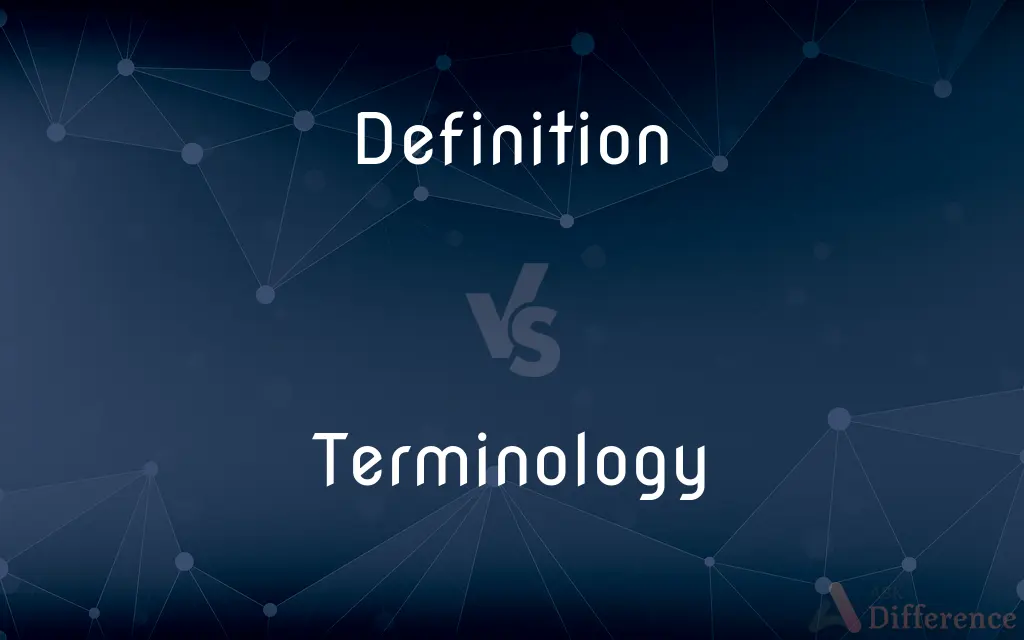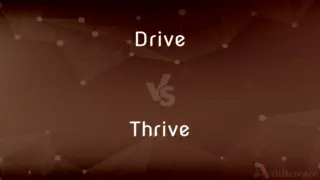Definition vs. Terminology — What's the Difference?
By Tayyaba Rehman & Fiza Rafique — Updated on February 27, 2024
Definition specifies the meaning of a word or phrase, focusing on clarity and precision. Terminology is a set of terms belonging to a specific subject or field, emphasizing specialized language use.

Difference Between Definition and Terminology
Table of Contents
ADVERTISEMENT
Key Differences
A definition aims to clarify the meaning of words or phrases, ensuring understanding and eliminating ambiguity. It's about precision and comprehensibility, serving as a fundamental tool in communication and learning. Terminology, on the other hand, encompasses the collection of terms that are specific to a particular field of study, profession, or activity. This specialized vocabulary facilitates precise communication among experts and practitioners, reducing the need for lengthy explanations.
The definition of "photosynthesis" explains the process by which green plants use sunlight to synthesize foods. In the medical field, terminology includes words like "anemia" or "hypertension," which convey specific conditions efficiently among healthcare professionals.
Definitions provide the essential meaning or explanation of individual words or phrases, terminology represents the collective language adopted by a particular domain. The relationship between the two is symbiotic; definitions help in understanding terminology, and terminology enriches the language of a domain.
Students are taught definitions to build a foundational vocabulary, which is later expanded into the terminology of various disciplines. This progression from basic definitions to specialized terminology underlines the growth in subject matter expertise.
The creation and evolution of terminology often necessitate the development of new definitions, as emerging fields and technologies introduce concepts previously unnamed. Thus, the dynamic nature of definitions and terminology reflects the continuous expansion and specialization of human knowledge.
ADVERTISEMENT
Comparison Chart
Purpose
To explain the meaning of words or phrases.
To present a set of specialized terms in a field.
Usage
General and educational contexts.
Specialized fields and professional contexts.
Nature
Singular and focused on clarity.
Collective and focused on domain-specific language.
Relationship
Fundamental to understanding terminology.
Comprised of terms that may require definitions.
Examples
"Gravity: The force that attracts a body toward the center of the earth."
Medical terminology: Words like "cardiomegaly" or "neuroplasticity."
Compare with Definitions
Definition
A precise statement or description.
The scientific definition of water is H2O.
Terminology
A set of terms used in a particular science, art, or other field.
Legal terminology includes terms like plaintiff and defendant.
Definition
A statement that explains the meaning of a word or phrase.
The definition of biodiversity encompasses the variety of life on Earth.
Terminology
A system of terms related by a concept or theme.
Musical terminology encompasses terms like allegro and forte.
Definition
The act of making something clear or distinct.
The definition of roles within the team was crucial for success.
Terminology
Specialized language of a professional field.
IT terminology involves acronyms like HTTP and IP.
Definition
Clarification of a concept's boundaries.
The legal definition of theft varies by jurisdiction.
Terminology
Words or phrases that convey specific meanings within a context.
Architectural terminology includes façade and balustrade.
Definition
An explanation of the essence of a subject.
The definition of democracy involves the idea of citizens participating in governance.
Terminology
The study of terms and their use.
Terminology is vital for medical students to communicate effectively.
Definition
A definition is a statement of the meaning of a term (a word, phrase, or other set of symbols). Definitions can be classified into two large categories, intensional definitions (which try to give the sense of a term) and extensional definitions (which try to list the objects that a term describes).
Terminology
Terminology is a general word for the group of specialized words or meanings relating to a particular field, and also the study of such terms and their use. This is also known as terminology science.
Definition
A statement of the exact meaning of a word, especially in a dictionary
A dictionary definition of the verb
Terminology
The scientific study of such terms.
Definition
A statement of the meaning of a word, phrase, or term, as in a dictionary entry.
Definition
The act or process of stating a precise meaning or significance; formulation of a meaning
The definition of terms is essential to any successful scholarly study.
Definition
A statement expressing the essential nature of something; formulation
Definition
The action or process of defining.
Definition
The act of defining; determination of the limits.
Definition
A concise explanation of the meaning of a word or phrase or symbol
Definition
Clarity of outline;
Exercise had give his muscles superior definition
Common Curiosities
What is terminology?
Terminology refers to a set of specialized terms within a particular field or subject.
What is a definition?
A definition is a statement that clearly explains the meaning of a word or phrase.
Why is understanding terminology important in specialized fields?
Understanding terminology is crucial for accurate and efficient communication among professionals within specialized fields.
How do new terms enter a field's terminology?
New terms often emerge from advancements in technology, research, and evolving practices within the field.
How do educators use definitions and terminology in teaching?
Educators use definitions to build foundational knowledge and terminology to advance students' understanding of specialized subjects.
Can terminology exist without definitions?
While terminology can exist as a set of terms, effective communication of their meanings requires clear definitions.
Are all terms within a field's terminology widely accepted?
While many terms are standardized, some may be subject to debate or variation depending on regional or institutional preferences.
Why might someone study terminology specifically?
Studying terminology is essential for mastering the language and concepts of a specific field, enhancing both comprehension and communication.
Is terminology only used in scientific and technical fields?
No, terminology is used in any field with a specialized set of terms, including arts, sports, and various professions.
How does a definition differ from terminology?
A definition clarifies the meaning of individual words or phrases, while terminology is a collection of specialized terms used in a specific domain.
Can a term have different definitions in different contexts?
Yes, a term can have varying definitions depending on the context or field in which it is used.
How do definitions contribute to learning?
Definitions help learners grasp the essential meanings of words and concepts, serving as a foundation for deeper understanding.
How do definitions and terminology evolve over time?
They evolve through changes in understanding, technological advancements, and shifts in cultural or professional practices.
Can the same word belong to the terminology of different fields?
Yes, the same word can have different meanings in the terminology of different fields, known as polysemy.
What role do definitions play in legal documents?
In legal documents, definitions establish precise meanings of terms to avoid ambiguity and ensure clarity in interpretation.
Share Your Discovery

Previous Comparison
Drive vs. Thrive
Next Comparison
Quarrion vs. CockatielAuthor Spotlight
Written by
Tayyaba RehmanTayyaba Rehman is a distinguished writer, currently serving as a primary contributor to askdifference.com. As a researcher in semantics and etymology, Tayyaba's passion for the complexity of languages and their distinctions has found a perfect home on the platform. Tayyaba delves into the intricacies of language, distinguishing between commonly confused words and phrases, thereby providing clarity for readers worldwide.
Co-written by
Fiza RafiqueFiza Rafique is a skilled content writer at AskDifference.com, where she meticulously refines and enhances written pieces. Drawing from her vast editorial expertise, Fiza ensures clarity, accuracy, and precision in every article. Passionate about language, she continually seeks to elevate the quality of content for readers worldwide.














































